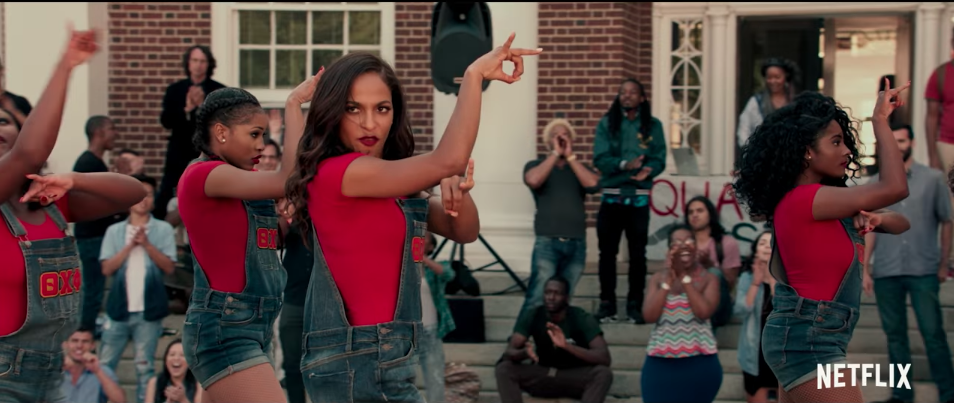I guess Step Sisters was going to be made eventually. Netflix’s comedy about a black sorority member teaching white girls to step feels like an unfortunate byproduct of increasing conversations about racial tension in the U.S., as if humor about race is trendy like off-the-shoulder sweaters and disposable like patterned socks.
Don’t get me wrong — there are films that have used the real differences between black and white people for eye-opening laughs (the crude Girls Trip, for example). But Step Sisters is the made-for-TV version. The jokes are cheap and shallow, which, in an age when black students are faced with aggression and bias on campuses, just doesn’t fly.
Jamilah (Megalyn Echikunwoke) is a college senior desperate for her parents’ legacy recommendation to ensure she’s accepted into Harvard Law School. She’s a Theta Chi Phi member, and her sorority is known for being the best at the culturally black dance called step. She has a boyfriend who would prefer you call him “pumpernickel” instead of “white bread.”
Jamilah is never bothered by the complete idiocy of the white people around her. She laughs it off when a friend from a white sorority tries to greet the “Thetas with bubbly hugs. When her boyfriend advises her to honor her ancestors’ struggle for access to education, she responds “Snuggle me!”
Jamilah’s (stereotypically) gay boss, a dean, offers to help her get into Harvard if she clears up a PR nightmare involving one of the white sorority members having sex on the front lawn. His idea: teach the white sorority to step ahead of a charity competition.
There are so many plot holes, there’s barely time to notice.
Number one: Jamilah agrees, feeling only slightly guilty for giving up her sorority’s culture to a bunch of racially clueless white girls led by a queen bee with an adopted black brother, Kevin.
Jamilah falls for Kevin (even after his sister Danielle threatens “I will wear your ass like a leg warmer” because “he doesn’t need some rebound chick heart-raping him.”) Kevin takes Jamilah on a date to a zombie party held at a costume store in the middle of the afternoon.
I cannot figure out whom this movie doesn’t attempt to offend.
Despite the girls’ hard work, at the first competition they fail miserably. Jamilah realizes they’ve lost sight of what makes them sisters.
In the film’s most heartfelt moment, Danielle says this about a girl from the South: “I knew that other houses would try to turn her into a New Yorker. She needed a place where she could let her Confederate flag fly.”
Some of the sisters shake their heads in a weak criticism of the joke. “Not literally!” Danielle squeals, and the filmmakers let it stand.
Cue next scene: One white girl is a stripper because she used to be in foster care (“white girls have problems, too.”)
Maybe this film is a terrible attempt at satire — a collection of stereotypes and hot topics on which it forgets to make pointed commentary. Maybe the writers just thought it was funny.
Sure, if a white girl yelling “chicken tenders” in a deep Southern accent to a black fraternity brother who then smacks her ass is funny.
The white sorority steps its heart out in the charity competition and wins second place. Unfortunately, the conniving black judges fudge the numbers and give the trophy to a black sorority dressed in kimonos with Asian-inspired haircuts. The “Thetas” offer to split the first-place prize.
Jamilah breaks up with her white boyfriend after he says black people can’t be racist. (So nuanced!) Later, she says he’s “still [her] n—-.” He says it’s the nicest thing anyone has ever said to him. The white girls, now officially accepted as part of the community, suddenly know how to rip off another part of black Greek life as they stroll in the bar.
If you need me, I’m still screaming at the screen.



